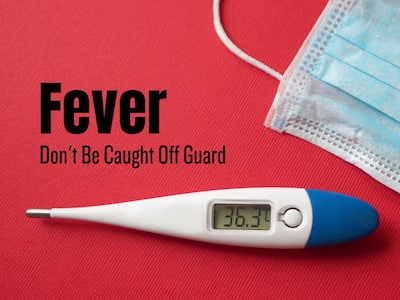
Don’t panic if you have a fever. Most fevers are harmless and will go away on their own. However, if you have any concerns, it’s always a good idea to visit a doctor.
Fever is a common occurrence that often accompanies various illnesses and infections. While it is a natural response of the body’s immune system, it can cause discomfort and distress. Choosing the right fever-reducing solution is crucial to alleviate symptoms and promote a swift recovery. This article aims to assist you in making an informed choice when it comes to selecting the most suitable fever-reducing method.
In this article, Dr. Usha Chennuru, Director – Medical Services, Cipla Health Ltd, talks about 6 important things that one needs to know and follow when trying to control fever at home.
6 Tips to Help You Reduce Fever at Home and Get Better Faster
Dengue, Nipah, and other viruses are spreading, but not all fevers are caused by the same virus. It’s crucial to keep in mind that a fever is your body’s defence against illness. The majority of fevers are brought on by small illnesses and disappear on their own in a few days. However, it’s crucial to contact a doctor if your temperature exceeds 103 degrees Fahrenheit (39.4 degrees Celsius) or if you experience additional symptoms like a stiff neck, headache, rash, or breathing difficulties. Here are some recommendations for managing a fever at home:
Understanding Fever
Fever is the body’s defense mechanism against infections caused by viruses, bacteria, and other pathogens. It is a sign that your immune system is actively working to combat these invaders. Uncontrolled high fever can lead to fatigue, discomfort, and dehydration. Monitoring your fever’s progression is important, especially for vulnerable populations like children and the elderly.
Home Remedies To Stay Hydrated During Fever
For mild fevers, there are several home remedies you can try. Staying hydrated is essential as fever can lead to fluid loss through sweating. Drinking water, clear soups, and herbal teas can help maintain your body’s hydration levels. Additionally, rest is crucial to allow your body to focus on fighting the infection. Lukewarm baths or using damp cloths can also help regulate body temperature.
Over-the-Counter Solutions
When dealing with a more uncomfortable fever, over-the-counter fever-reducing medications can provide relief. common options are paracetamol Acetaminophen helps lower fever and reduce pain
Prescription Medications
In cases of prolonged or high fever, especially when accompanied by severe symptoms, seeking medical attention is crucial. A healthcare professional can diagnose the underlying cause of the fever and prescribe appropriate medications. Antibiotics are often prescribed for bacterial infections, while antiviral medications are used for viral infections. Completing the prescribed course of medication is essential to ensure effective treatment.
READ RELATED: Nipah Virus In Kerala: Schools, Colleges In Kozhikode To Remain Shut Till Sep 24
Natural Approaches
If you lean towards natural remedies, there are alternative approaches to consider for low-grade fever management, especially those that don’t have any other associated ominous symptoms. Herbal teas made from ingredients such as ginger, chamomile, and elderberry have been used for their potential fever-reducing properties. However, it’s important to recognize that natural remedies might not be as potent as conventional medications, especially for more severe fevers.
Seeking Medical Advice
While mild fevers can be managed at home, certain situations warrant medical attention:
- High Fever: If you have a high fever, please consult a healthcare practitioner immediately. This is especially true for infants and young children.
- Persistent Fever: If your fever persists for more than three days, consulting a healthcare professional is important to identify any underlying issues.
- Severe Symptoms: If your fever is accompanied by severe symptoms like intense headaches, breathing difficulties, chest pain, rash, or confusion, it’s crucial to seek medical attention promptly.
Conclusion
Fever is a natural response that indicates your body is actively fighting an infection. Selecting the appropriate fever-reducing solution depends on the severity of your fever, your medical history, and any underlying conditions. Whether you choose home remedies, over-the-counter medications, prescription drugs, or natural alternatives, the goal is to find the right balance between alleviating discomfort and supporting your body’s healing process. Always listen to your body, monitor your symptoms closely, and consult a healthcare professional when necessary to ensure a safe and effective recovery.
Total Wellness is now just a click away.
Follow us on
Don’t Miss Out on the Latest Updates.
Subscribe to Our Newsletter Today!
window.addEventListener(‘load’, (event) => {
$(‘#commentbtn’).on(“click”,function(){
(function(d, s, id) { var js, fjs = d.getElementsByTagName(s)[0]; if (d.getElementById(id)) return; js = d.createElement(s); js.id = id; js.src = “//connect.facebook.net/en_US/sdk.js#xfbml=1&version=v2.3”; fjs.parentNode.insertBefore(js, fjs);}(document, ‘script’, ‘facebook-jssdk’));
$(“.cmntbox”).toggle();
});
});







